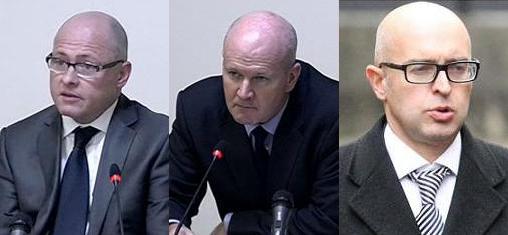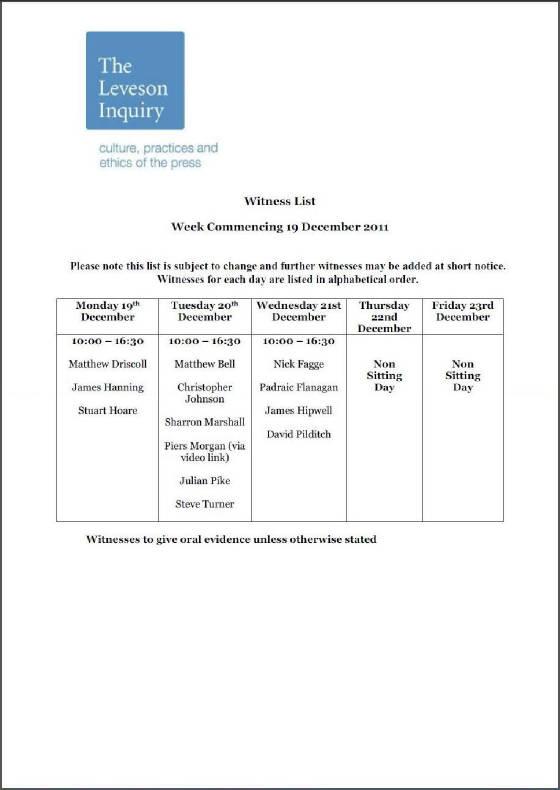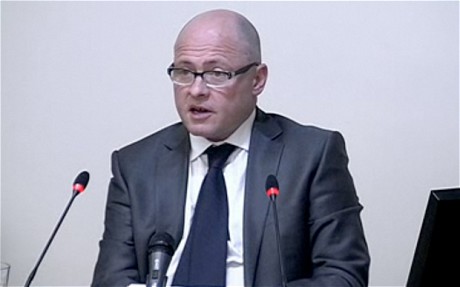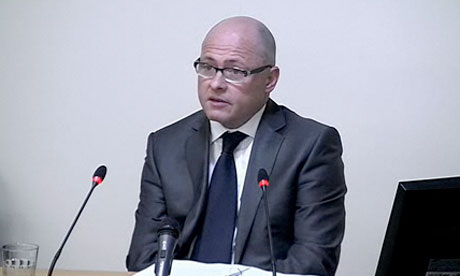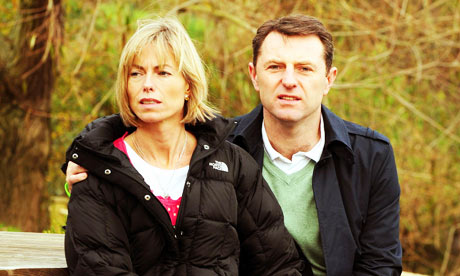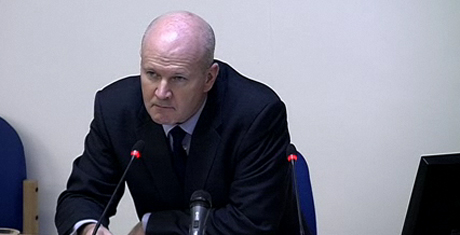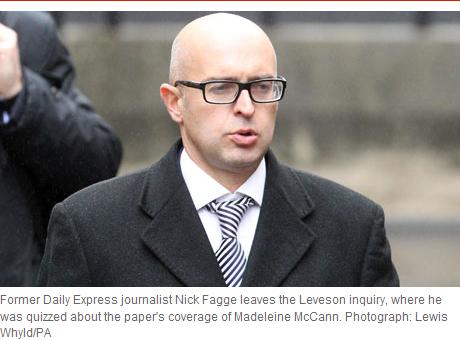Evidence given to the Leveson Inquiry by journalists David Pilditch, Padraic Flanagan and Nick Fagge,
who wrote about the disappearance of Madeleine McCann for the Daily Express
Witness List: Week Commencing 19 December 2011
Leveson inquiry: jailed Daily Mirror reporter
to give evidence on press standards, 21 December 2011
Leveson inquiry: jailed Daily Mirror reporter to give evidence
on press standards The Telegraph 8:15AM GMT 21 Dec
2011 - Extract -
Leveson Inquiry: live, 21 December 2011
Leveson Inquiry: live The Telegraph By Andy Bloxham - Extract - 11:34 Hipwell has now left the stand, his evidence over. The next witness is David Pilditch ,
a former colleague of Hipwell and a journalist for 26 years on the Daily Mirror, then the Daily Express.11:38
The opening topic for discussion is the Madeleine McCann story. Pilditch's first visit to Portugal, as an Express
reporter, was for six weeks on a story that he said was "uniquely challenging".11:40
He says working in Portugal - where it is illegal for the police to speak about stories - was "like
Doctor Who , being transported into an Orwellian nightmare ". He added that you could
not cover the story which was "in everybody's interest" but couldn't cover it because you couldn't get
to the truth.11:44 Pilditch's initial sources are listed as resort workers, holidaymakers
and ex-pats but the police refused to help.You would get a whole load of witnesses giving you a similar description and you go to the police with it and they can't
tell you anything. 11:48 The inquiry hears that Portugese journalists were in contact with
senior officers and a third party dialogue was used to stand up stories or develop lines. This enabled an "accurate insight"
into the investigation into Maddie's disappearance.11:53 Pilditch describes the pressures
of writing stories for which there is great demand on scant reliable information.You feel uncomfortable writing stories when you are put in a position that you can't do what you normally do, to
be certain that what you are doing is fair and accurate... [but] you couldn't just not write a story.
David Pilditch, of the Daily Express, giving evidence 11:59
He tells the inquiry that the McCann's status of arguidos meant that they could be subjected
to much tougher questioning, according to what he was told by Portugese lawyers.12:00 He adds
that the McCanns' spokespeople were telling journalists what the police were asking them in dealing with them as a type
of suspect.12:04 He describes the role of Clarence Mitchell , the McCanns'
official spokesman, who...commented on every story and often in quite strident terms that this was part of a black propaganda campaign and there
was no evidence to support what the police were saying. 12:07 Robert Jay asks whether Pilditch
was responsible for a headline on his story. He clearly says "no". The inquiry hears it is never the journalist.12:10 Leveson seems surprised that journalists do not read every word of every story that has their
byline on it prior to publication.12:13 The inquiry is hearing the nuts and bolts of how stories
are compiled when multiple journalists are involved, with some on location around the world. Both Mr Jay and Lord Justice
Leveson appear not to have come across this before.12:18 Pilditch tells the inquiry more on the
stages involved in handling stories, saying "I file my story and there are other processes involved after that".12:26 He defends his use of Portugese police sources to stand up stories, saying:There must be some plausibility in what a modern police force were telling you in the 21st century in a European country. 12:43 Both Leveson and Jay are suggesting that what was written after Madeleine'e disappearance
was not true but Pilditch is insistent that it was thought to be true at the time.12:56 James Dingemans
QC , counsel for the Daily Express, has expressed his concern that the inquiry is being "highjacked" and
turned from its "inquisitorial" nature into one which is increasingly "adversarial", with journalists
being given questions for which they are not prepared.13:04 Leveson interrupts a spiel from Mr
Sherborne , who represents 51 "victims" of press malpractice, about allegations that the McCanns
had something to do with Madeleine's disappearance to say:There is absolutely no foundation at all that the allegations that emerged through the press at this time that Dr and
Dr McCann were involved in any way in any inappropriate conduct in relation to the disappearance of their daughter. 13:06 That's it for the morning session. More soon.-----------------14:12 Padraic
Flanagan , a senior reporter at the Daily Express, is now on the stand.14:16 Flanagan
says he had "between 50 and 60" sources who he used to call regularly when covering the Madeleine McCann story.14:23 Flanagan is pushed on why sometimes stories have to be written in spite of an absence of provable
facts on a major story and says:It would take quite a brave reporter to call the desk and say "I'm not really sure about this, I'm not going
to send anything in today". 14:27 Observers on Twitter have pointed out that the impeccable
Mr Jay's tie appears to have become askew.14:28 Flanagan says the expense of sending reporters
to foreign countries means you are expected to deliver stories.14:29 Leveson again raising his
concern that the stories under discussion were "fragile" with "a lot of theorising, no solid facts, and this
was a great risk".14:30 "Everyone was aware of these stories, how fragile they were,
it's sometimes the case on these crime stories that there's theorising... I think it's a national tendency,"
Flanagan says.14:32 Leveson asks: "Where does balance, fairness, propriety come into it
all?"14:33 Flanagan says: "I'm not sure I can answer that."14:34 Leveson is asking why newspapers don't carry stories saying how difficult
it can be to do their job in reporting the full facts of any given story. Flanagan says that's fine but "what do
you fill the paper with the next day?".
-------------14:37 Flanagan is now done, the next
witness is Nick Fagge , a former reporter for the Daily Express who now works for the Daily Mail.14:42 Fagge tells the inquiry that he took steps to make sure the story was legally able to be published
but added that:In Portugal, I wouldn't be thinking about the High Court to be honest. 14:48 Fagge
says the bosses of the Daily Express were "obsessed" with the Madeleine McCann story: The Madeleine story was on the front page of the Daily Express more than any other newspaper because the editor decided it
would sell newspapers. It became an obsession of his. 14:49 That's the end of evidence
today. I hope our coverage has been interesting.14:56 A final word from Lord Justice
Leveson , who has asked for any participant who is concerned about the credibility of witnesses to let him know in
writing:Fairness remains the watchword I'm trying to apply to all.
Leveson Inquiry: live, 21 December
2011
Leveson Inquiry: live Guardian News Blog By Lisa O'Carroll and Josh Halliday - Extract - 11.36am: 11.37am: Madeleine McCann story.11.39am: "Certainly in relation
to the police investigation, in a story like this you would expect the primary information would be coming from the police
and in this case that just didn't happen. You are in an impossible situation, because you try and do everything to get
to the bottom of what happened Madeleine McCann. That was left to the parents in this case." 11.41am:
Leveson inquiry: David Pilditch
11.42am: 11.43am: "The police had been round the resort and other areas on their own inquiries and we were finding out
lines of inquiries from local people. They were given descriptions of potential suspects and when a whole lot of witnesses
give the same description you have a pretty good idea of what the police were working on." 11.45am: 11.52am: "I knew that the reports were correct but I also knew
that because there was no confirmation there were going to be difficulties if any complaints were made." 11.55am: "We may not be able to defend these things because we may not be able to get confirmation. They took
that on board." "I am not a legal expert, but I
felt that the situation as it presented itself, that was the case. I'm certain the newsdesk would have conversations with
lawyers about this. 11.57am: 12.01pm: "This was a very big
story, obviously there would be discussions on the newspapers from lawyers, all sorts of parties involved. The actual legal
aspects would be something that the lawyers would be discussing. 12.03pm: 12.05pm: 12.09pm:
Kate and Gerry McCann
12.13pm: 12.16pm: 12.19pm: 12.29pm: "The priest, it says, felt under tremendous emotional strain because of some sort of confession had been
given to him by Dr Kate McCann. The story says 'The tormented priest insisted he would stand by his vows and take his
secrets to the grave'." 12.38pm: "I
think I explained, there is emotional turmoil, but I'm reporting what's happening on the ground, that particular day."
12.42pm: "All the things
that are being written, about the priest ... it's all fluff, there's nothing to it" "It's not tittle tattle, because it was information coming from senior detectives
who were investigating the case." 12.46pm: 12.50pm: 12.59pm: "Everybody
is agreed that there is absolutely no foundation at all for the allegation that emerged throughout the press at this time
that Dr and Dr McCann were involved in any way, in any inappropriate conduct in relation to the disappearance of their daughter. 1.06pm: ----------------------2.07pm: 2.08pm: 2.10pm: 2.12pm:
"There was a wide variety of sources that I
used in Portugal" 2.13pm: 2.18pm: "Working in Portugal the first question
you asked yourself wasn't 'Can I stand this up?'; it was 'What can I find today?'"
Leveson inquiry: Padraic Flanagan
2.23pm: "It would be quite a brave reporter to call the desk and say 'I'm not
really sure about this, I'm not going to send anything back today' 2.27pm: "No, I think at the Express they're
more likely to want to avoid massive legal bills. I get the impression they're more likely to want to settle out of court
rather than fight cases" 2.30pm: "A lot of theorising. I think
everybody was aware of the strength of these stories, how fragile they were. I think it's sometimes the case on crime
stories that this kind of thing process takes place; supposition and theorising ... with the Portuguese's stance on talking
to the press there was a very large vacuum there." "I
do have some responsibility - for instance I can't write a story that is a lie and claim to the newsdesk that it is true." 2.34pm: "The
one thing that you don't want to fill the paper story surely is stuff that is terribly damaging to people and maybe complete
piffle." 2.37pm: "I would like to take an opportunity to apologise to the McCanns for adding to their
distress and hurt for what I wrote." 2.39pm: "Everyone
just went like a train on the story and it's destructive." ------------2.41pm: 2.43pm:
"I wouldn't be thinking if
the story came to the high court, I'd be thinking of verifying the story as best I good, I wouldn't be thinking of
a potential libel case." 2.45pm: "No, because
the editor of the time decided it was the only story he was interested in and put it on the front page regardless of how strong
the story was." "Not, at its truth. the Madeleine story was on the front page of the Daily Express
more than any other newspaper, because he decided it would sell newspapers, it became an obsession of his." 2.46pm: 2.49pm: "It is tragic" 2.51pm:
Witness Statement of David Pilditch
Witness Statement of David PilditchPDF Download:
Witness Statement of David Pilditch (pdf, 433K)
click here to download file
Leveson Inquiry: David Pilditch, 21
December 2011
Leveson Inquiry: David Pilditch
Leveson Inquiry: Transcript of David
Pilditch's evidence, 21 December 2011
Leveson Inquiry: Transcript of David Pilditch's
evidence Leveson Inquiry Wednesday 21 December 2011 - Extract - 7
MR JAY: Sir, the next witness is Mr Pilditch.-----------------------------Afternoon session - Extract
-
-------------------PDF download:
Transcript of Morning Hearing (pdf, 167KB)
click here to download file
Witness Statement of Padraic Flanagan
Witness Statement of Padraic FlanaganPDF Download:
Witness Statement of Padraic Flanagan (pdf,
372K)
click here to download file
Leveson Inquiry: Transcript of Padraic
Flanagan's evidence, 21 December 2011
Leveson Inquiry: Transcript of Padraic Flanagan's
evidence Leveson Inquiry Wednesday 21 December 2011 - Extract - 17
MR JAY: Thank you, Mr Pilditch. It's Mr Flanagan next.PDF
download:
Transcript of Afternoon Hearing (pdf, 74.6KB)
click here to download file
[Witness Statement of Nick Fagge not yet available (as at
22/12/2011)]
Leveson Inquiry: Transcript of Nick
Fagge's evidence, 21 December 2011
Leveson Inquiry: Transcript of Nick Fagge's evidence
Leveson Inquiry Wednesday 21 December 2011 - Extract - 3
MR JAY: The last witness is Mr Fagge, please.-----------------------PDF download:
Transcript of Afternoon Hearing (pdf, 74.6KB)
click here to download file
Daily Express editor was 'obsessed'
with Madeleine McCann story, inquiry hears, 21 December 2011
Daily Express editor was 'obsessed' with Madeleine
McCann story, inquiry hears The Guardian Lisa O'Carroll and Jason Deans
The Daily Express editor became "obsessed" with the Madeleine
McCann story and put it on its front page repeatedly just to sell newspapers, the Leveson inquiry has heard.

